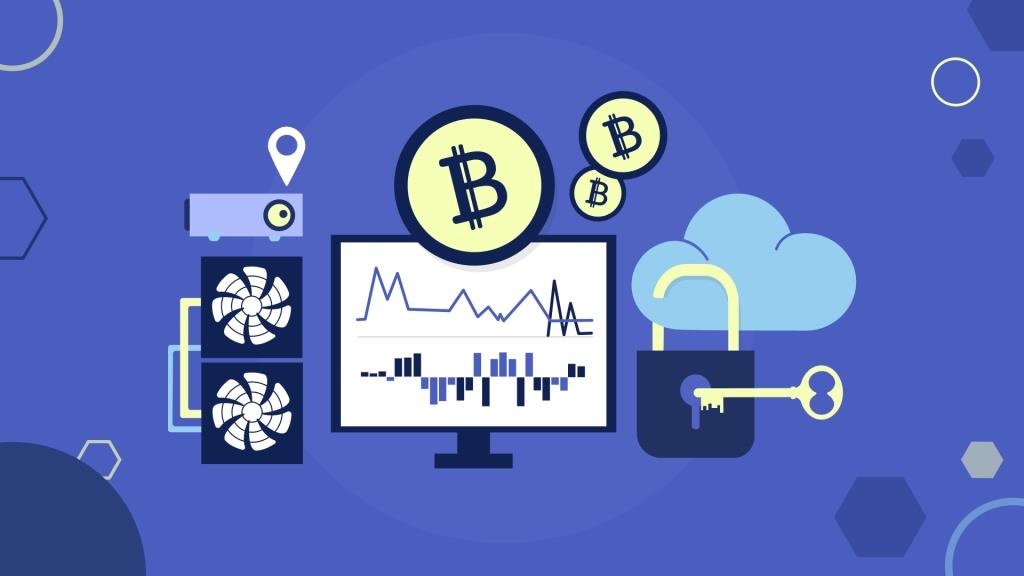Economy
How to Stake Cryptocurrencies

Staking cryptos is one of the best methods of generating passive income. What is more impressive is that it is pretty easy: you simply lock your coins and wait for rewards. Staking involves holding your coins or tokens in a wallet or exchange over a specific period.
If you can hold your coins for a long time, the rewards will be even higher. However, crypto staking only works with proof of stake (POS) coins, such as (HI).
For a beginner, we must say that the process might look a little complex. This is why we have developed this guide to help simplify the process.
Staking Cryptocurrency: What Does It Mean?
This is the process of locking your cryptocurrencies to help with transaction validation in a selected blockchain network. In return, you get rewarded with a part of the transaction fee paid by users and tokens of the native network.
Crypto staking is done through a node, which is a computer connected to the blockchain network to validate transactions. This implies that staking helps to keep the blockchain network running flawlessly and avoid the risk of errors.
Pros and Cons of Staking Cryptos
Once your coins have been staked correctly, they are used to “mine” the next block to earn some rewards for incentivizing the system. This method is referred to as proof of stake (POS) protocol. The more coins you commit, the higher the chances of getting selected to mine the next block and getting rewarded. Although the reward mainly comes in the form of the same crypto coins, it is also possible to get it in a different type of reward.
Pros
Depending on the crypto of choice, you can earn 5-20% of the staked value per year. We must say that this is not a get-rich-quick method because you need to wait for some time to reap maximum rewards. If you get it right, this is an excellent way to maximize passive returns. Here is a summary of the pros:
- You are able to earn interest on crypto holdings.
- Easy because you do not need specialized equipment.
- Staking means you are helping to secure the crypto network and its efficiency.
- Less energy is required for crypto staking compared to mining.
Cons
When it comes to investing in cryptos, it is advisable to only consider it after understanding how blockchain systems work. For example, the risk of bugs getting into your wallet is always looming. It is because of this that you need to carefully weigh between crypto wallet vs exchange and decide where you will store the coins
Furthermore, it is important to appreciate that price fluctuations can easily result in unexpected losses. For people who store their coins in the exchanges, there is also a risk of hacking or exit scams. Therefore, you must start by comprehensively researching the exchange of choice.
Here is a summary of the risks:
- High volatility raises the danger of losing your coins.
- You are unable to do anything with your crypto coins during the staking period.
- The unstaking period usually takes longer than anticipated.
How to Stake Your Crypto Coins
Many crypto platforms have a fixed payment period. For example, hi pays participants an amount equal to 11% of staked coins every Friday. Other crypto networks have their models of rewarding stakers.
hi Dollar has grown to become one of the leading cryptos that you can stake to generate passive income daily. It is a non-profit banking system and the first cross-platform financial services based on social media chat tools. This means that you do not need to install anything to get started. Simply visit WhatsApp or Telegram to register for an account and start to stake cryptocurrency. Alternatively, you can register on its web app to buy hi Dollars directly.
Here is a summary of the main steps to follow to start staking your hi Dollars.
- Buy crypto that supports staking.
- Transfer the crypto to your hi wallet.
- Confirm receipt in your wallet.
- Enable staking from the wallet.
- Wait to collect the reward every Friday.
Economy
Champion Breweries Concludes Bullet Brand Portfolio Acquisition

By Aduragbemi Omiyale
The acquisition of the Bullet brand portfolio from Sun Mark has been completed by Champion Breweries Plc, a statement from the company confirms.
This marks a transformative milestone in the organisation’s strategic expansion into a diversified, pan-African beverage platform.
With this development, Champion Breweries now owns the Bullet brand assets, trademarks, formulations, and commercial rights globally through an asset carve-out structure.
The assets are held in a newly incorporated entity in the Netherlands, in which Champion Breweries holds a majority interest, while Vinar N.V., the majority shareholder of Sun Mark, retains a minority stake.
Bullet products are currently distributed in 14 African markets, positioning Champion Breweries to scale beyond Nigeria in the high-growth ready-to-drink (RTD) alcoholic and energy drink segments.
This expansion significantly broadens the brewer’s addressable market and strengthens its revenue base with an established, profitable portfolio that already enjoys strong brand recognition and consumer loyalty across multiple markets.
“The successful completion of our public equity raises, together with the formal close of the Bullet acquisition, marks a defining moment for Champion Breweries.
“The support we received from both existing shareholders and new investors reflects strong confidence in our long-term strategy to build a diversified, high-growth beverage platform with pan-African scale.
“Our focus now is on disciplined execution, integration, and delivering sustained value across markets,” the chairman of Champion Breweries, Mr Imo-Abasi Jacob, stated.
Through this transaction, Champion Breweries is expected to achieve enhanced foreign exchange earnings, expanded distribution leverage across African markets, integrated supply chain efficiencies, portfolio diversification into high‑growth consumer beverage categories, and strengthened presence in the RTD and energy drink segments.
The acquisition accelerates Champion Breweries’ transition from a regional brewing business to a multi-category consumer platform with continental reach.
Bullet Black is Nigeria’s leading ready-to-drink alcoholic beverage, while Bullet Blue has built a strong presence in the energy drink category across several African markets.
Economy
M-KOPA Nigeria Plans Expansion to Edo, Others After N231bn Credit Milestone

By Adedapo Adesanya
Emerging market fintech firm, M-KOPA, has announced plans to deepen its reach in Nigeria to the South South and South East regions, starting with Edo this year, after providing N231 billion in credit to over 1 million customers in the country.
The firm released its first Nigeria-focused Impact Report, which showed that Nigeria is M-KOPA’s fastest-growing market and fastest to reach the milestone.
Since its foray into the Nigerian market in 2019, M-KOPA has been working to dismantle barriers to financial inclusion by providing flexible smartphone financing and digital financial tools that align with how people in the informal economy earn and manage their money.
It operates in six states in the country, including Lagos, Ogun, and Oyo, among others.
The report highlights the company’s contribution to income generation, digital inclusion and economic opportunity for Every Day Earners across the country.
The report showed that M-KOPA has enabled 290,000 first-time smartphone users, while 56 per cent of agents accessed their first income opportunity through the platform.
It showed high income and livelihood gains among its users, with about 77 per cent of customers leveraging smartphones or digital loans obtained through the platform to generate income, indicating that access to financed devices is directly supporting micro-entrepreneurial activity and informal sector productivity.
Furthermore, 75 per cent of users report higher earnings since gaining access to M-KOPA’s services, suggesting measurable improvements in personal revenue streams. On the distribution side, 99 per cent of agents disclose increased earnings, reflecting positive spillover effects across the company’s value chain.
In addition, 81 per cent of long-term customers state that their household expenses have improved, pointing to enhanced financial stability and better consumption smoothing over time.
Speaking on the report, Mr Babajide Duroshola, General Manager, M-KOPA Nigeria, said, “Nigeria represents extraordinary potential, and we’re proud that it has become M-KOPA’s fastest-growing market. Our Impact Report shows that when Every Day Earners gain access to the right digital and financial tools, they use them to create stability and long-term progress for their families. This is about access that unlocks opportunity and sustained prosperity.”
On its expansion plans Nigeria-wide, the M-KOPA helmsman said, “Many of the states we are considering are already similar to the ones we are currently in proximity… So, there is proximity and similarity between these states, and that’s what we are going to do, starting with Edo.”
He noted that as M-KOPA Nigeria continues to expand, the focus remains on ensuring more everyday earners gain access to the digital and financial tools they need to build resilient, prosperous futures in Nigeria’s rapidly digitising economy.
Economy
Tinubu Okays Extension of Ban on Raw Shea Nut Export by One Year

By Aduragbemi Omiyale
The ban on the export of raw shea nuts from Nigeria has been extended by one year by President Bola Tinubu.
A statement from the Special Adviser to the President on Information and Strategy, Mr Bayo Onanuga, on Wednesday disclosed that the ban is now till February 25, 2027.
It was emphasised that this decision underscores the administration’s commitment to advancing industrial development, strengthening domestic value addition, and supporting the objectives of the Renewed Hope Agenda.
The ban aims to deepen processing capacity within Nigeria, enhance livelihoods in shea-producing communities, and promote the growth of Nigerian exports anchored on value-added products, the statement noted.
To further these objectives, President Tinubu has authorised the two Ministers of the Federal Ministry of Industry, Trade and Investment, and the Presidential Food Security Coordination Unit (PFSCU), to coordinate the implementation of a unified, evidence-based national framework that aligns industrialisation, trade, and investment priorities across the shea nut value chain.
He also approved the adoption of an export framework established by the Nigerian Commodity Exchange (NCX) and the withdrawal of all waivers allowing the direct export of raw shea nuts.
The President directed that any excess supply of raw shea nuts should be exported exclusively through the NCX framework, in accordance with the approved guidelines.
Additionally, he directed the Federal Ministry of Finance to provide access to a dedicated NESS Support Window to enable the Federal Ministry of Industry, Trade and Investment to pilot a Livelihood Finance Mechanism to strengthen production and processing capacity.
Shea nuts, the oil-rich fruits from the shea tree common in the Savanna belt of Nigeria, are the raw material for shea butter, renowned for its moisturising, anti-inflammatory, and antioxidant properties. The extracted butter is a principal ingredient in cosmetics for skin and hair, as well as in edible cooking oil. The Federal Government encourages processing shea nuts into butter locally, as butter fetches between 10 and 20 times the price of the raw nuts.
The federal government said it remains committed to policies that promote inclusive growth, local manufacturing and position Nigeria as a competitive participant in global agricultural value chains.
-

 Feature/OPED6 years ago
Feature/OPED6 years agoDavos was Different this year
-
Travel/Tourism10 years ago
Lagos Seals Western Lodge Hotel In Ikorodu
-

 Showbiz3 years ago
Showbiz3 years agoEstranged Lover Releases Videos of Empress Njamah Bathing
-

 Banking8 years ago
Banking8 years agoSort Codes of GTBank Branches in Nigeria
-

 Economy3 years ago
Economy3 years agoSubsidy Removal: CNG at N130 Per Litre Cheaper Than Petrol—IPMAN
-

 Banking3 years ago
Banking3 years agoSort Codes of UBA Branches in Nigeria
-

 Banking3 years ago
Banking3 years agoFirst Bank Announces Planned Downtime
-

 Sports3 years ago
Sports3 years agoHighest Paid Nigerian Footballer – How Much Do Nigerian Footballers Earn














3 Comments